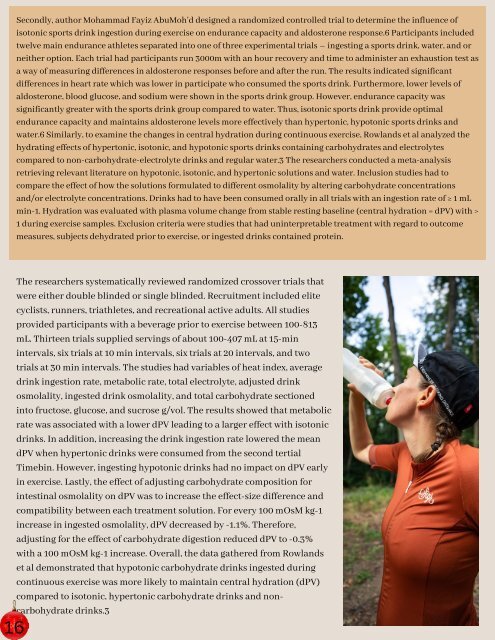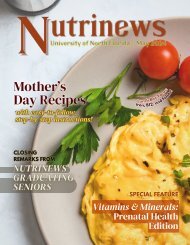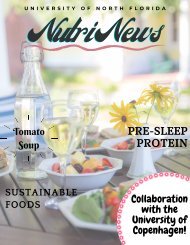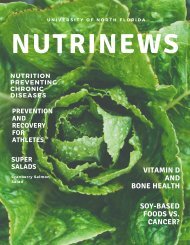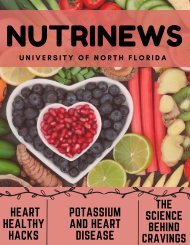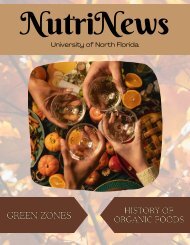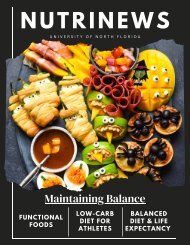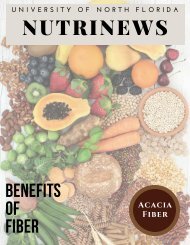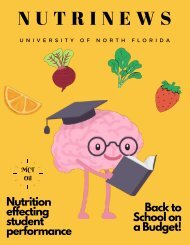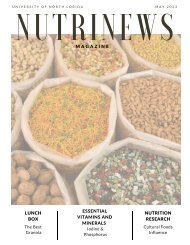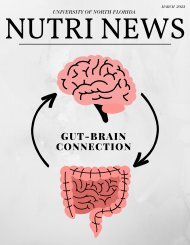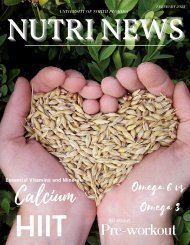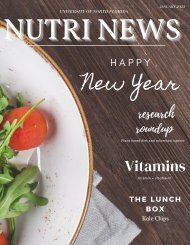December Issue 2023
You also want an ePaper? Increase the reach of your titles
YUMPU automatically turns print PDFs into web optimized ePapers that Google loves.
Secondly, author Mohammad Fayiz AbuMoh’d designed a randomized controlled trial to determine the influence of<br />
isotonic sports drink ingestion during exercise on endurance capacity and aldosterone response.6 Participants included<br />
twelve main endurance athletes separated into one of three experimental trials – ingesting a sports drink, water, and or<br />
neither option. Each trial had participants run 3000m with an hour recovery and time to administer an exhaustion test as<br />
a way of measuring differences in aldosterone responses before and after the run. The results indicated significant<br />
differences in heart rate which was lower in participate who consumed the sports drink. Furthermore, lower levels of<br />
aldosterone, blood glucose, and sodium were shown in the sports drink group. However, endurance capacity was<br />
significantly greater with the sports drink group compared to water. Thus, isotonic sports drink provide optimal<br />
endurance capacity and maintains aldosterone levels more effectively than hypertonic, hypotonic sports drinks and<br />
water.6 Similarly, to examine the changes in central hydration during continuous exercise, Rowlands et al analyzed the<br />
hydrating effects of hypertonic, isotonic, and hypotonic sports drinks containing carbohydrates and electrolytes<br />
compared to non-carbohydrate-electrolyte drinks and regular water.3 The researchers conducted a meta-analysis<br />
retrieving relevant literature on hypotonic, isotonic, and hypertonic solutions and water. Inclusion studies had to<br />
compare the effect of how the solutions formulated to different osmolality by altering carbohydrate concentrations<br />
and/or electrolyte concentrations. Drinks had to have been consumed orally in all trials with an ingestion rate of ≥ 1 mL<br />
min-1. Hydration was evaluated with plasma volume change from stable resting baseline (central hydration = dPV) with ><br />
1 during exercise samples. Exclusion criteria were studies that had uninterpretable treatment with regard to outcome<br />
measures, subjects dehydrated prior to exercise, or ingested drinks contained protein.<br />
The researchers systematically reviewed randomized crossover trials that<br />
were either double blinded or single blinded. Recruitment included elite<br />
cyclists, runners, triathletes, and recreational active adults. All studies<br />
provided participants with a beverage prior to exercise between 100-813<br />
mL. Thirteen trials supplied servings of about 100-407 mL at 15-min<br />
intervals, six trials at 10 min intervals, six trials at 20 intervals, and two<br />
trials at 30 min intervals. The studies had variables of heat index, average<br />
drink ingestion rate, metabolic rate, total electrolyte, adjusted drink<br />
osmolality, ingested drink osmolality, and total carbohydrate sectioned<br />
into fructose, glucose, and sucrose g/vol. The results showed that metabolic<br />
rate was associated with a lower dPV leading to a larger effect with isotonic<br />
drinks. In addition, increasing the drink ingestion rate lowered the mean<br />
dPV when hypertonic drinks were consumed from the second tertial<br />
Timebin. However, ingesting hypotonic drinks had no impact on dPV early<br />
in exercise. Lastly, the effect of adjusting carbohydrate composition for<br />
intestinal osmolality on dPV was to increase the effect-size difference and<br />
compatibility between each treatment solution. For every 100 mOsM kg-1<br />
increase in ingested osmolality, dPV decreased by -1.1%. Therefore,<br />
adjusting for the effect of carbohydrate digestion reduced dPV to -0.3%<br />
with a 100 mOsM kg-1 increase. Overall, the data gathered from Rowlands<br />
et al demonstrated that hypotonic carbohydrate drinks ingested during<br />
continuous exercise was more likely to maintain central hydration (dPV)<br />
compared to isotonic, hypertonic carbohydrate drinks and noncarbohydrate<br />
drinks.3<br />
16


